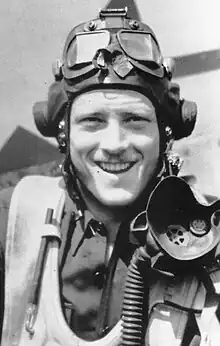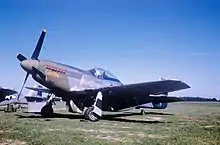Claude J. Crenshaw | |
|---|---|
 Crenshaw in 1944 | |
| Birth name | Claude James Crenshaw |
| Born | December 12, 1918 Monroe, Louisiana, U.S. |
| Died | March 17, 1972 (aged 53) San Bernardino, California, U.S. |
| Buried | Victor Valley Memorial Park Cemetery, Victorville, California |
| Allegiance | United States |
| Service/ | |
| Years of service | 1942–1965 |
| Rank | |
| Unit | |
| Commands held |
|
| Battles/wars | World War II |
| Awards | |
Claude James Crenshaw (December 12, 1918 – March 17, 1972) was a United States Air Force lieutenant colonel and a flying ace, who was credited in destroying seven enemy aircraft in aerial combat during World War II.
Early life
Crenshaw was born in 1918, in Monroe, Louisiana.[1]
World War II

In April 1944, Crenshaw was assigned to the 369th Fighter Squadron within the 359th Fighter Group in the European Theater of Operations. Based at RAF East Wretham, he flew missions in the North American P-51 Mustang.[2][3]
On September 11, 1944, while leading a flight over Kölleda, Germany, Crenshaw's flight encountered 100 Messerschmitt Bf 109s. In the encounter, Crenshaw shot down two Bf 109s and on the same mission, he and his wingman strafed an enemy airfield with Crenshaw destroying an enemy airplane on the ground. On September 18, during a mission over Düsseldorf, Germany, he shot down a Bf 109 that was attacking his wingman, bringing his total to three aerial victories.[4][5]
On November 21, during a bomber escort over Merseburg, Germany, his flight encountered a massive formation of Focke-Wulf Fw 190 attempting to attack the bombers. During the dogfight, Crenshaw and his wingman were separated from the flight after flying into a haze. In the dogfight, he and his wingman alone attacked the gaggle of Fw 190s with Crenshaw shooting down four Fw 190s and another probable. After his return to the base, it was discovered that only three of the six guns in his P-51 were working during the mission. For his heroism in the mission, Crenshaw was awarded the Distinguished Service Cross.[6][7][2]
During World War II, Crenshaw was credited in shooting down seven enemy aircraft in aerial combat, one probable and three destroyed on the ground while strafing enemy airfields. While serving with the 359th FG, he flew P-51 bearing the name "Louisiana Heatwave".[8]
Post war
In December 1944, Crenshaw returned to the United States. Following the end of World War II, he continued to serve in the newly created United States Air Force and retired in 1965 at the rank of lieutenant colonel.[8][9]
Later life
Crenshaw married Johnnie Ruth, née Hudson in 1943. The couple had three daughters and one son, and numerous grand and great-grandchildren.[10]
Crenshaw died on March 17, 1972, at the age of 53 due to lung cancer. He was buried at Victor Valley Memorial Park Cemetery in Victorville, California.[11]
Aerial victory credits
| Date | # | Type | Location | Aircraft flown | Unit Assigned |
|---|---|---|---|---|---|
| September 11, 1944 | 2 | Messerschmitt Bf 109 | Kölleda, Germany | P-51D Mustang | 368 FS, 359 FG |
| September 18, 1944 | 1 | Bf 109 | Düsseldorf, Germany | P-51D | 368 FS, 359 FG |
| November 21, 1944 | 4 | Focke-Wulf Fw 190 | Merseburg, Germany | P-51D | 368 FS, 359 FG |
- SOURCES: Air Force Historical Study 85: USAF Credits for the Destruction of Enemy Aircraft, World War II
Awards and decorations
Crenshaw's awards include:[1]
 USAF Command pilot badge USAF Command pilot badge | |
| Distinguished Service Cross | |
| Distinguished Flying Cross with bronze oak leaf cluster | |
| Air Medal with one silver and three bronze oak leaf clusters | |
| Air Medal (second ribbon required for accoutrement spacing) | |
| Air Force Presidential Unit Citation | |
| American Campaign Medal | |
| European-African-Middle Eastern Campaign Medal with three bronze campaign stars | |
| World War II Victory Medal | |
| Army of Occupation Medal with 'Germany' clasp | |
| National Defense Service Medal with bronze service star | |
| Armed Forces Expeditionary Medal | |
| Air Force Longevity Service Award with four bronze oak leaf clusters | |
| Armed Forces Reserve Medal with bronze hourglass device | |
Distinguished Service Cross citation

- Crenshaw, Claude J.
- Captain (Air Corps), U.S. Army Air Forces
- 369th Fighter Squadron, 359th Fighter Group, 8th Air Force
- Date of Action: November 21, 1944
- Citation:
The President of the United States of America, authorized by Act of Congress, July 9, 1918, takes pleasure in presenting the Distinguished Service Cross to Captain (Air Corps) Claude James Crenshaw, United States Army Air Forces, for extraordinary heroism in connection with military operations against an armed enemy while serving as Pilot of a P-51 Fighter Airplane in the 369th Fighter Squadron, 359th Fighter Group, Eighth Air Force, while serving as Flight Leader of a bomber escort mission in the vicinity of Merseburg, Germany, on 21 November 1944. On this date, accompanied by only his wingman, Captain Crenshaw attacked a formation of one hundred enemy fighters having a top cover of thirty-five additional fighter aircraft. In his great desire to protect the bomber formation, he pursued the enemy relentlessly, destroying four of their aircraft and damaging still another despite the enemy's vast numerical superiority. The outstanding heroism and determination to destroy the enemy displayed by Captain Crenshaw on this occasion are in keeping with the highest traditions of the Armed Forces of the United States.[1]
References
- 1 2 3 "Valor Awards for Claude J. Crenshaw". Military Times. Retrieved September 29, 2023.
- 1 2 Bowman, Martin W. (2009). Fighter Bases of WW II US 8th Army Air Force Fighter Command USAAF, 1943–45: P-38 Lightning, P-47 Thunderbolt and P-51 Mustang Squadrons in East Anglia, Cambridgeshire and Northamptonshire. Casemate Publishers. p. 90. ISBN 9781783409167. Retrieved September 29, 2023.
- ↑ "359th Fighter Group". Army Air Corps Library and Museum. Retrieved October 22, 2023.
- ↑ Crenshaw, Claude. "Combat Report (11 September 1944)". WWII Aircraft Performance. Retrieved September 29, 2023.
- ↑ Crenshaw, Claude. "Combat Report (18 September 1944)". WWII Aircraft Performance. Retrieved September 29, 2023.
- ↑ Crenshaw, Claude. "Combat Report (21 November 1944)". WWII Aircraft Performance. Retrieved September 29, 2023.
- ↑ Hammel, Eric (2020). Air War Europa: America's Air War Against Germany in Europe and North Africa 1942 - 1945. p. 656. ISBN 9798569101122. Retrieved September 29, 2023.
- 1 2 Jackson, Robert; Ritger, Lynn (2020). P-51 Mustang. Pen & Sword Books Limited. p. 57. ISBN 9781526759931. Retrieved September 29, 2023.
- ↑ Air Force Register. United States Air Force. 1966. p. 79. Retrieved October 22, 2023.
- ↑ "Johnnie Crenshaw Obituary". Legacy. July 16, 2006. Retrieved September 29, 2023.
- ↑ Shores, Christopher (2008). Aces High, A Further Tribute to the Most Notable Fighter Pilots of the British and Commonwealth Air Forces in WWII · Volume 2. Grub Street Publishing. p. 1952. ISBN 9781909808430. Retrieved October 23, 2023.